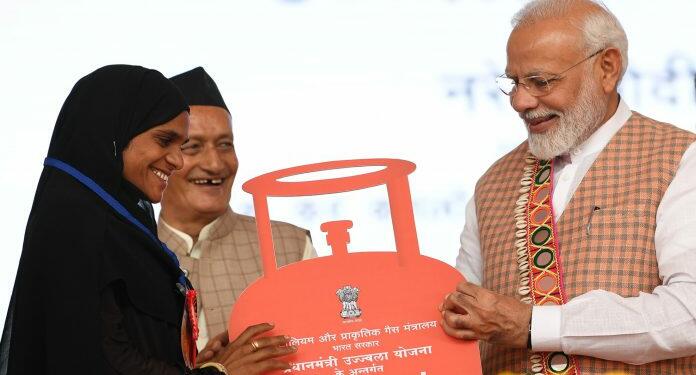The Modi government launched the “Ujjwala Scheme” in 2016 which is a scheme of the Ministry of Petroleum & Natural Gas for providing LPG connections to women from Below Poverty Line (BPL) households. The scheme has not only helped poor to get access to cooking gases but has also resulted in dramatic reduction of pollution. A recent study has claimed that the government’s flagship Ujjwala programme has prevented at least 1.5 lakh pollution-related premature deaths in the year 2019 alone.
Ujjwala scheme preventing deaths and reducing pollution
As per the first independent impact assessment of Ujjwala programme, it has been claimed that “Greater penetration and usage of LPG as a cooking fuel is estimated to have prevented at least 1.5 lakh pollution-related premature deaths in the year 2019 alone. At least 1.8 million tonnes of PM2.5 emissions was avoided that year, all thanks to the Ujjwala Yojana. The study was conducted by Ajay Nagpure, Ritesh Patidar and Vandna Tyagi of World Resources Institute (WRI) India. However, it is still continued ongoing and will be reviewed later.
The researchers stated that “The benefits of Ujjwala measured by them were conservative estimates and the actual benefits could be even higher.”
Nagpure, while interacting with the media, reported that “The avoidance of premature deaths, for example, has been estimated only for indoor air pollution. But cooking fuel also contributes to outdoor air pollution. Earlier studies have indicated that biomass burning in household cooking could be contributing 30-40 per cent of outdoor air pollution. We have not estimated the health or emission benefits of reduction in outdoor air pollution.”
He further added, “Also, the benefits have been estimated for the year 2019 only. Similar benefits would have accrued in subsequent years as well, though we do not have full data as of now. The cumulative benefit of this one single intervention is huge. I would say Ujjwala Yojana would be one of the most effective government interventions to improve air quality and reduce health risks from air pollution.”
The study has revealed that “About 6.1 lakh deaths in India in 2019 could be attributed to household air pollution.” The study considered only those households with no access to LPG.
The team also highlighted the impact of pollution from those households with LPG connection but were using traditional biomass fuels. When these houses are considered, indoor air pollution-related deaths in 2019 rose to 10.2 lakh.
However, with no Ujjwala in the picture, the number of deaths could have been as high as 11.7 lakh, as per the study.
A successful Ujjwala scheme
In India, the poor had a very limited access to cooking gas before 2014. Back then, the government used to discuss whether to subsidize 6 cylinders or 9 or 12 and then came the Modi Government which first launched the “Give it up” movement under which many people forfeited their LPG subsidy.
Read more: The unprecedented success of Ujjwala scheme
The Ujjwala scheme was necessary to introduce as burning coal or wood instead of buying LPG cylinders used to increase problems like asthma. The usage of fossil fuels also increased the cases off heart disease, stroke, chronic obstructive pulmonary disease, and lung cancer.
The Scheme provides financial support of INR 1600 for each LPG connection to the BPL households, interest-free loan to purchase stove and refill by Oil Marketing Companies. The administrative cost of INR 1600 per connection, which includes a cylinder, pressure regulator, booklet, safety hose, etc., would be borne by the Government.
This scheme also marks a huge step towards ensuring energy security. Energy security is basically the combination of natural resources and the availability of natural resources for energy consumption. For a modern economy to work, it’s essential to have cheap access to energy resources.
Thus, Ujjwala scheme has not only emerged as a ray of hope for the poor but also a silent war against pollution.




















